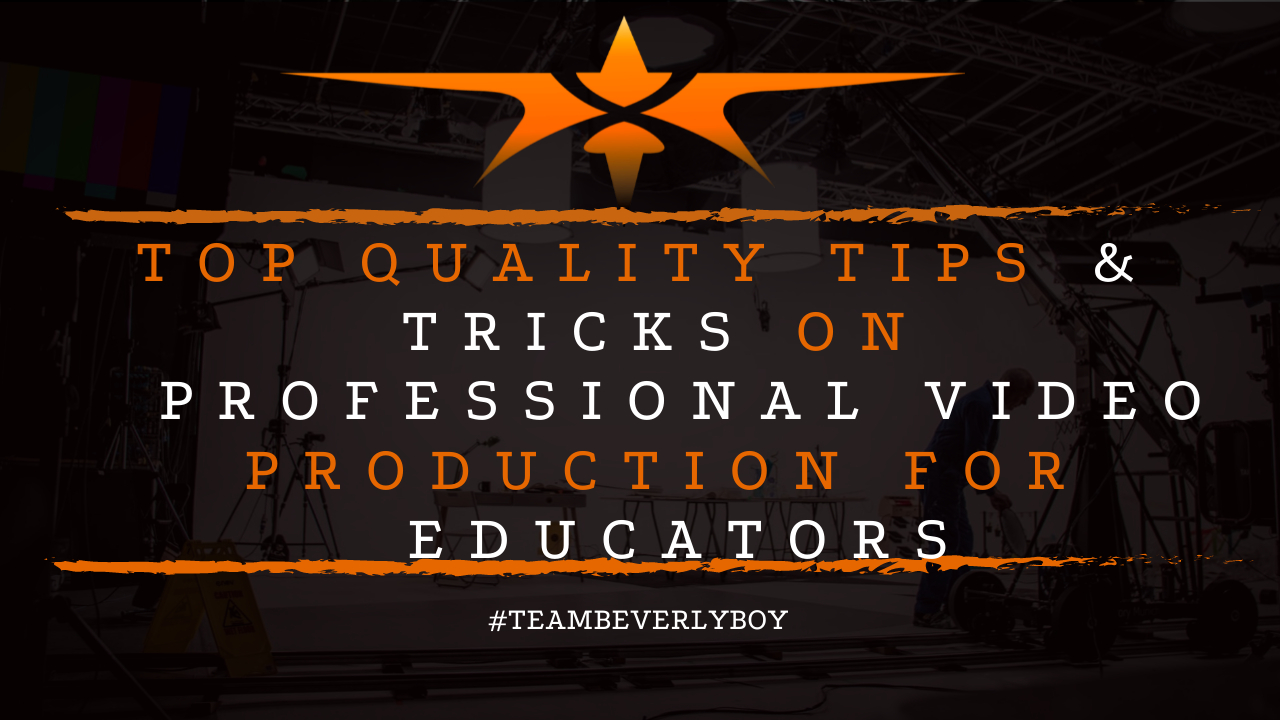
Top Quality Tips & Tricks on Professional Video Production for Educators
As an educator, you already wear many hats in the classroom. On any given day you could be educator, guidance counselor, art or music teacher, nurse, and various other professions all rolled into one. It’s no wonder then that educators are now expected to know a thing or two about video production, too. In fact, video production for educators is incredibly important as more students turn their attention to tablets, phones, or the television in order to learn the lessons at hand.
If you’re wondering how you can incorporate more video content into your classroom, you’re certainly not alone. Follow these top quality tips and tricks on professional video production for educators to get started with video tutorials and eLearning videos in your classroom environment. Because educational videos don’t have to be boring or hard to follow. In fact, they should be just the opposite! They should be fun, engaging, and entertaining.

Why are Videos Important in the Classroom?
A rise in the number of students who have access to a tablet, computer, or similar device at home has been both beneficial and detrimental to student learning. Student attention spans are down to just 8 seconds, substantially lower than a decade ago. As an educator, it’s hard to attract the attention of your students and equally challenging to maintain their attention in order to ensure that what you’re teaching them is actually sticking in the minds.
Videos are both a culprit of this low attention span and they’re also an assistance to students that might struggle to learn as a result of such low attention spans. A single video has the power to deliver substantially more information, in greater detail, and at higher quality than lecture or text alone. Thus, video is important in the classroom for a variety of reasons including:
- Video allows educators to time and space for active learning.
- Video can be reused over and over by an educator to teach multiple students.
- Video helps students learn more quickly leaving more time for live discussion and student engagement.
- Video can accommodate a wide range of learning styles and may motivate students that otherwise lack motivation.
Certainly the benefits of using video in the classroom are widespread and as varied as the students they’re used to teach. But video production for educators isn’t always a cut and dry process. There’s a lot that goes into producing an educational video, and teachers are already busy wearing many different hats in the classroom.
Pre-Production Tips for Educators

When it comes to video production for educators, the first step that we can provide any useful tips for begins before the production process ensues. It takes place in pre-production or the planning stages when the subject and scope of an educational video first begin to formulate.
During pre-production, educators are thinking about what they want to teach, who they want to teach, and why. These key questions are important to the scope of any video project but there are also key questions relative to the actual video production process which come up at this time, too. For instance, educators must consider:
- What their budget is for video production.
- What their timeframe is for video production.
- What style video they want to produce.
- How long their video should be.
This is also where you’re going to outline the following:
- Course context – what are you going to teach and how does it align with your syllabus?
- Learning objectives – what are the goals or objectives of each video you create?
- Script creation – consider a short, bullet point list, of key points to teach.
- Style – start thinking about what style video you want to produce.
Planning all of these essential elements of video production is important for educators to ensure that their project continues down a path of success. Take your time, and think carefully about each of the above questions so that you can plan accordingly.
Video Production Tips for Educators
As your project moves into the production process, as an educator you must now start to heavily focus on wearing that new hat as a “Film producer” in addition to a teacher. During video production you’re going to:
- Plan the speaker or teacher for your video. Will you record yourself?
- Plan for camera setup and, if using multiple cameras, plan accordingly.
- Coordinate lighting and audio setup to ensure the speaker can be heard and there is no outside noise or distraction.
- Use a storyboard to guide your recording.
- Make sure that you capture all of your recordings on shoot day. It’s always harder to come back and reshoot later on.
The production process is the most involved process that will occur when producing an educational video. Many teachers opt to hire a crew to provide professional video production for educators. This way they don’t have to worry about equipment, or the intricacies of producing live footage.

Post-Production Tips for Educators
As you move past the production of your footage into post-production the focus is on pulling all of the audio and video files together to make a cohesive learning experience. Video editing is an entirely different focus all its own and it takes a lot of time to prefect. The best tip we can provide for educators at this point is to consider hiring a professional post-production editor to help out at this phase.
If you can’t afford to hire an editor, consider the following:
- Incorporate multiple learning styles into the final video.
- Make sure the audio is amazing!
- Do your best to incorporate the use of images or graphics that make the topic easier to follow.
- Find ways to signal new concepts and to highlight important subjects.
- Use a conversational tone to keep students engaged.
- Build familiarity with your concepts by introducing and revisiting them throughout.
Ultimately, you also want to be sure to keep your video short and focused. If you find it to be overly long, this is a good time to cut it back and consider making more than one video. By following these tips on professional video production for educators, you’ll find yourself and your students satisfied with your video outcomes!


